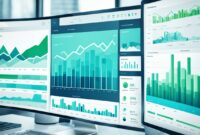Do you want to combine data analysis, strategy, and problem-solving in your career? Then, consider becoming a Business Intelligence Analyst. It’s a field filled with opportunities for those keen on using data to boost business success.
Starting a career or shifting to a more analytical role? This article will help you become a top Business Intelligence Analyst. We’ll explore the essential skills, knowledge, and tools you need to stand out.
As a Business Intelligence Analyst, your main job is to find insights and trends through data analysis. Your findings will influence business decisions. This ensures that organizations make choices that are informed by data, fostering growth and success.
In this article, we discuss the role of a Business Intelligence Analyst, the crucial skills for success, and the technologies to use. By the end, you’ll know exactly how to become a valuable Business Intelligence Analyst in today’s business world.
Understanding the Role of a Business Intelligence Analyst
As a Business Intelligence Analyst, your job is key in helping firms make smart choices based on data. You deal with lots of information and find insights that help the business grow. By analyzing data, making reports, and offering advice, you help improve company decisions.
At the heart of your job is analyzing data. You look closely at data to spot trends and patterns. This can be sales numbers, how customers act, or market changes. Your skill in seeing the story data tells is crucial.
You must also share your findings well with important company people. This means making complex data simple and visual. You use charts, graphs, and dashboards in your reports. These help leaders make informed steps that match the company’s goals.
Another key part of your job is giving useful insights. Just showing data isn’t enough. You need to advise and suggest strategies to help the business. By linking your analysis with the company’s aims, you create valuable actions. These lead to better performance and a stronger position in the market.
You turn raw data into insights that matter, helping companies act based on data. Your ability to analyze, report, and advise makes you stand out in this exciting area.
Developing the Necessary Skills as a Business Intelligence Analyst
Being a Business Intelligence Analyst means you need many skills. You must know how to visualize data and analyze statistics. These skills help you make big contributions to your team’s decisions.
1. Data Visualization
For a Business Intelligence Analyst, knowing how to show data is critical. You need to turn complex data into charts and graphs that are easy to understand. Using tools like Tableau, Power BI, and Python will help you make visuals that can guide decisions based on data.
2. SQL Querying
Being good at SQL querying is essential too. SQL lets you work with data in databases effectively. You can find important data and change it in ways that reveal new insights.
3. Data Modeling
Data modeling involves designing a database’s structure. It’s important to know how to organize and manage lots of data well. Learning about dimensional modeling and data normalization will make you better at creating effective data models.
4. Statistical Analysis
Using statistical methods to analyze data helps find important trends. Knowing statistics allows you to come to correct conclusions and support your decisions with data. Tools like R and Python enhance your ability to analyze data.
To become a better Business Intelligence Analyst, keep learning. Look for training sessions, online classes, and certifications from well-known organizations. Staying current with new trends and technologies is key in this fast-moving field.

Tools and Technologies for Business Intelligence Analysts
As a Business Intelligence Analyst, you’ll use many tools and technologies. They help collect, analyze, and turn data into insights for better decisions. Here are the main tools these analysts use:
1. Tableau
Tableau lets you make interactive dashboards and reports. Its easy interface helps you show complex data in a clear way. You can spot patterns and trends to make informed choices.
2. Power BI
Power BI is by Microsoft. It connects to various data sources and makes reports that are easy to understand. Business Intelligence Analysts can dig into data and find insights with it.
3. Python
Python is key for data science. Knowing it lets you handle big data sets well. It has tools for cleaning data and making advanced analyses.

Business Intelligence Analysts also use SQL, QlikView, and R. Knowing these tools will help you get insights and share findings. This leads to better business decisions.
Conclusion
Becoming a top Business Intelligence Analyst is a path full of rewards. It offers great chances for growth and making a big difference. Business Intelligence Analysts are vital in using data to make smart decisions and plan strategies.
To shine in this field, work on your skills in data analysis, visualization, and stats. These skills help you stand out and support organizations in all sectors. Today, turning raw data into helpful insights is more important than ever.
As an analyst, you’ll use tools like Tableau, Power BI, and Python. They help you gather, analyze, and share data effectively. With these tools, you can find important information and create reports and visuals for others.
Let data power your career as a Business Intelligence Analyst. Use your talents and know-how to make wise, data-driven choices. These decisions can boost performance, spark innovation, and give you an edge in the business world.



